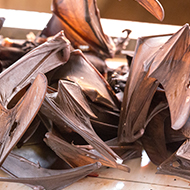
Scientists recommend increase in laboratory testing closer to areas of risk.
Closer monitoring of wildlife is required to prevent future pandemics such as COVID-19 from occurring, a group of wildlife experts has warned.
Writing in the journal Science, experts from the Wildlife Disease Surveillance Focus Group set out several recommendations for improving how wildlife can be better tested and tracked.
The group, which includes researchers from the University of Edinburgh, calls for an increase in laboratory testing capacity at or near locations where humans and wildlife interact. Currently, 62 per cent of laboratories that screen for animal pathogens are located in North America and Europe, which does not reflect the areas at most risk of emerging diseases,the researchers said.
The group also notes that improvements in testing technology could help decentralize testing capacity, for example by using portable DNA sequencing technology. Such technology is already being trialled at the University of Edinburgh, in partnership with the governments of Zambia and Malaysia, in a project led by the TRACE Wildlife Forensics Network.
Furthermore, the group recommends the creation of a central publicly-accessible database for recording the characteristics of animal viruses to help monitor the risk of crossover to humans. Researchers say this would allow any scientists to see how pathogens are evolving, how common they are worldwide and identify early mitigation measures, including antiviral treatments or vaccines.
“We know that many diseases like COVID19 can cross from animals to humans but we don’t focus enough on the animal side of the human-animal equation,” explained Professor Anna Meredith, chair of zoological and conservation medicine at the Royal (Dick) School of Veterinary Studies. “Locally-driven surveillance and responses will empower local wildlife and public health professionals to constantly monitor for pathogens at source and improve the likelihood of prevention or early mitigation of future crossover events.”



 HMRC has invited feedback to its communications regarding the employment status of locum vets and vet nurses.
HMRC has invited feedback to its communications regarding the employment status of locum vets and vet nurses.